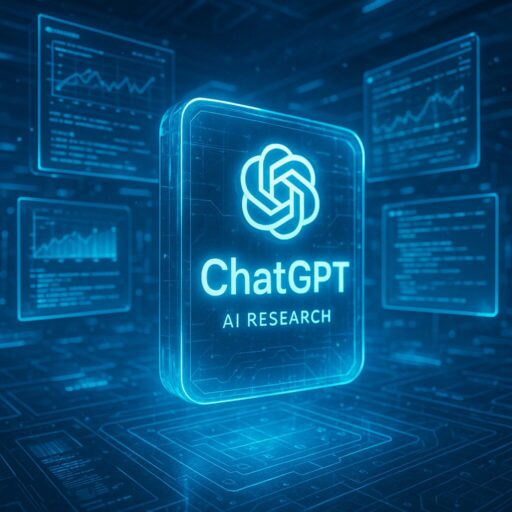In a significant move toward democratizing advanced AI capabilities, OpenAI has unveiled a new “lightweight” version of its powerful Deep Research tool for ChatGPT. The game-changing announcement marks the first time this comprehensive research capability will be available to free users, albeit with monthly limits.
The Evolution of AI Research Assistance
If you’ve used ChatGPT for research before, you’ve likely noticed its limitations when tackling complex topics. Standard ChatGPT conversations provide helpful but sometimes superficial information based on the model’s training data. The Deep Research feature fundamentally changes this dynamic by leveraging:
- Advanced reasoning capabilities
- Active web search integration
- Multi-step research planning
- Source citation and verification
Rather than simply generating a response from internal knowledge, Deep Research actively explores the web, analyzes multiple sources, and creates comprehensive reports with proper citations – functioning more like a digital research assistant than a simple chatbot.
Lightweight Deep Research: Power Meets Practicality
The newly announced lightweight version is powered by OpenAI’s o4-mini model. According to OpenAI, it delivers reports that are “nearly as intelligent” as the original Deep Research tool but with shorter responses that maintain the same depth and quality. 1
While the full Deep Research version (powered by a version of the upcoming o3 model) can analyze hundreds of sources to generate extensive reports, the lightweight alternative strikes a balance between comprehensiveness and efficiency. It typically produces:
- 1-2 page reports (versus longer full reports)
- Well-sourced information with proper citations
- Results in approximately 5-10 minutes
This approach appears to be a strategic move for OpenAI, as the company notes the lightweight version is “significantly cheaper to serve” 2 – an important consideration given reports that OpenAI spends millions just processing basic courtesy phrases like “please” and “thank you.”
Access Tiers: Who Gets What
The introduction of this feature comes with clearly defined usage limits based on subscription level:
- Free users: 5 lightweight Deep Research queries per month
- Plus & Team users: 25 total monthly tasks across both versions
- Pro users: 250 total monthly tasks
- Enterprise & Education users: Access coming next week with same limits as Team/Plus
All usage limits reset every 30 days, beginning with your first use of the feature. 3
How Deep Research Works
Using the Deep Research feature is straightforward but requires some patience as the AI conducts its investigation:
- Visit ChatGPT and select the Deep Research option
- Enter a detailed prompt about your research topic
- Optionally add context via documents, images, or other files
- Respond to any clarifying questions (recommended for best results)
- Monitor the research progress in the sidebar
- Review your completed report with citations
The process may take anywhere from 5-30 minutes depending on the complexity of the topic, as the AI needs to visit multiple sources and synthesize information. 4
Real-World Applications
Early testing of the lightweight Deep Research tool has shown impressive results across diverse scenarios:
- Specialized learning: Creating comprehensive guides for learning niche skills (like playing the Handpan instrument)5
- Financial research: Analyzing market sentiment for specific stocks
- Technical information: Locating hard-to-find specifications (such as obscure car part numbers)
- Complex planning: Developing detailed strategies based on multiple information sources
The technology particularly shines when tackling questions that would traditionally require hours of manual research across multiple websites.
The Competitive Landscape
OpenAI isn’t alone in offering advanced research capabilities. This move appears strategically timed as Google’s Gemini recently made a similar feature available to free users with an identical 5 queries per month limit. 6 Meanwhile, Perplexity offers a comparable service with 3 free searches daily.
According to user testing, ChatGPT’s Deep Research offers some advantages over competitors:
- More concise reporting compared to Gemini’s “unnecessarily verbose” outputs
- Smoother integration of links within text
- Clearer source attribution
However, it still lacks some features like PDF export (available in Gemini) and may struggle with region-specific information.
Limitations and Future Possibilities
Despite its capabilities, OpenAI acknowledges several current limitations of Deep Research:
- Occasional factual hallucinations or incorrect inferences
- Difficulty distinguishing authoritative sources from less reliable ones
- Weakness in confidence calibration
- Formatting errors in reports and citations
- Initial processing delays
Future improvements planned by OpenAI include connection to specialized data sources (including subscription-based and internal resources), integration with other agentic features, and enhanced outputs with embedded images and data visualizations. 7
This feature represents a significant step toward OpenAI’s broader vision of developing AI systems capable of conducting novel scientific research and solving complex problems.
The Democratization of AI Research
By extending Deep Research capabilities to free users, OpenAI is making sophisticated AI research tools more accessible to students, researchers, and curious minds who may not have the budget for premium subscriptions. This expansion aligns with the growing trend of AI companies finding sustainable ways to offer advanced features while managing operational costs.
While the limits for free users are modest, five comprehensive research queries monthly still represents substantial value for those with occasional in-depth research needs.
Have you tried ChatGPT’s new lightweight Deep Research tool yet? What topics would you investigate with this new capability? Share your experiences and research plans in the comments!
Footnotes
1 The Verge: ChatGPT lightweight deep research free plus team pro
2 The Verge: ChatGPT lightweight deep research free plus team pro
3 Lifehacker: ChatGPT finally has free but limited deep research tool
4 OpenAI: Introducing Deep Research
5 Lifehacker: ChatGPT finally has free but limited deep research tool


